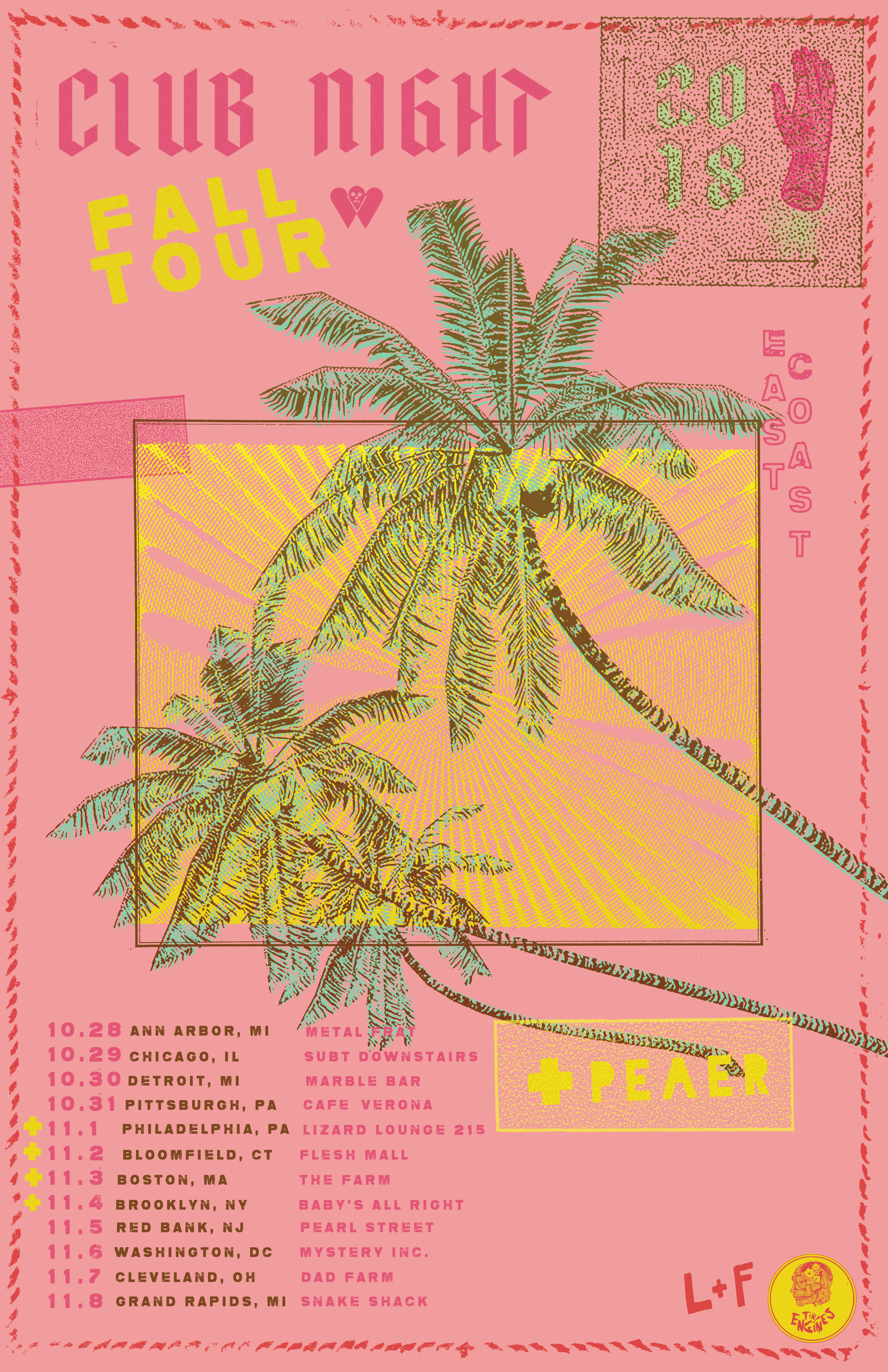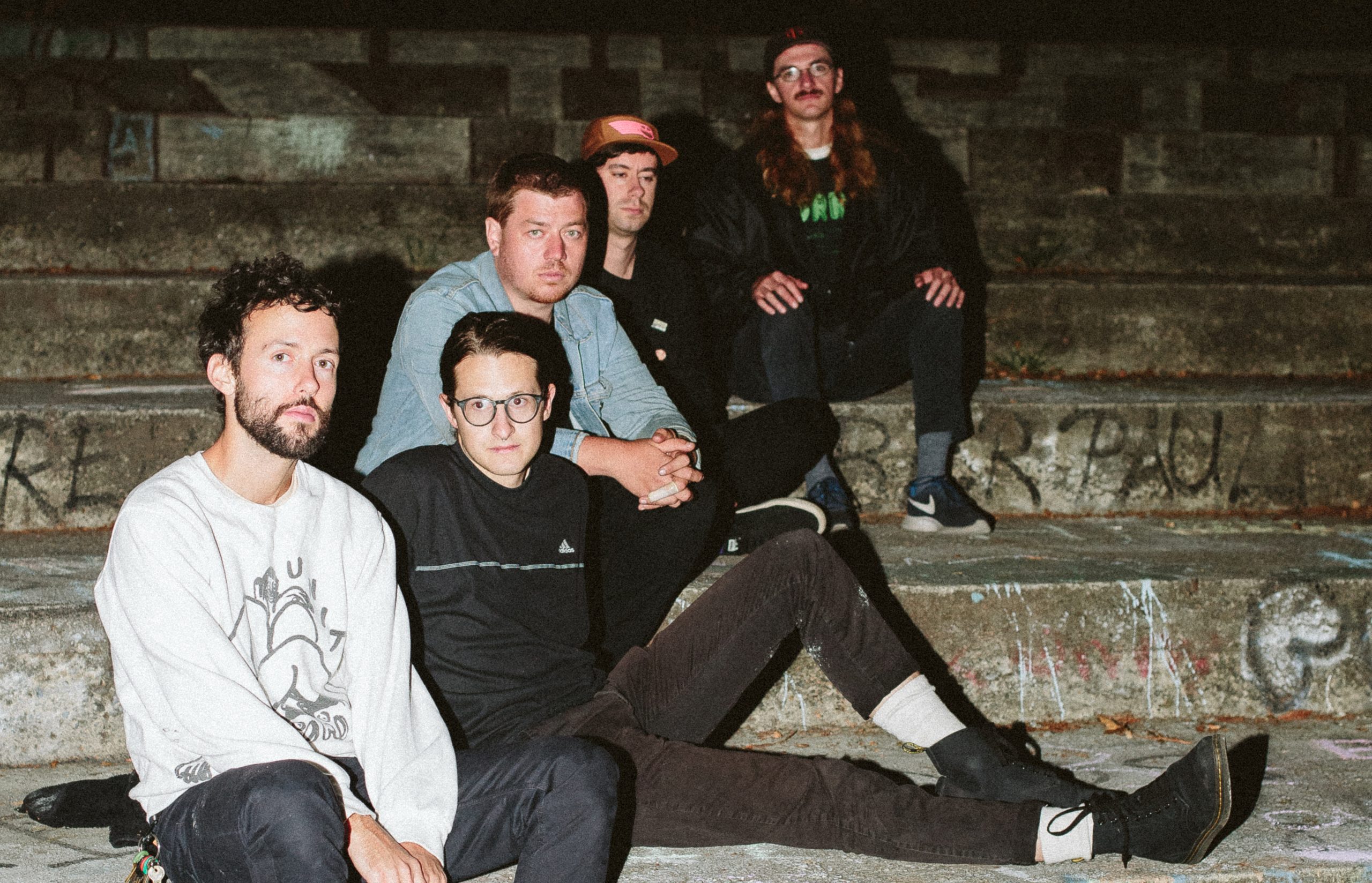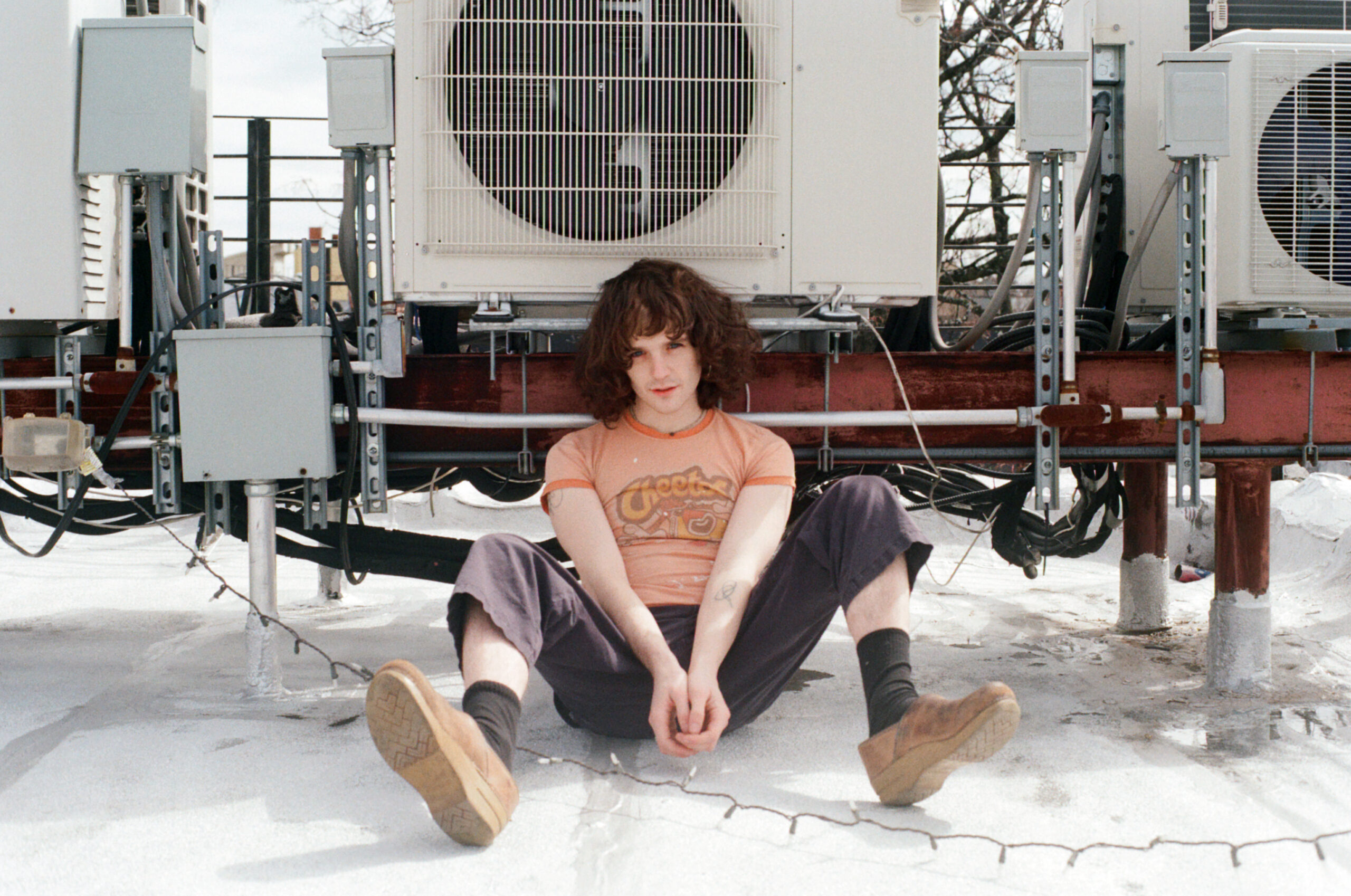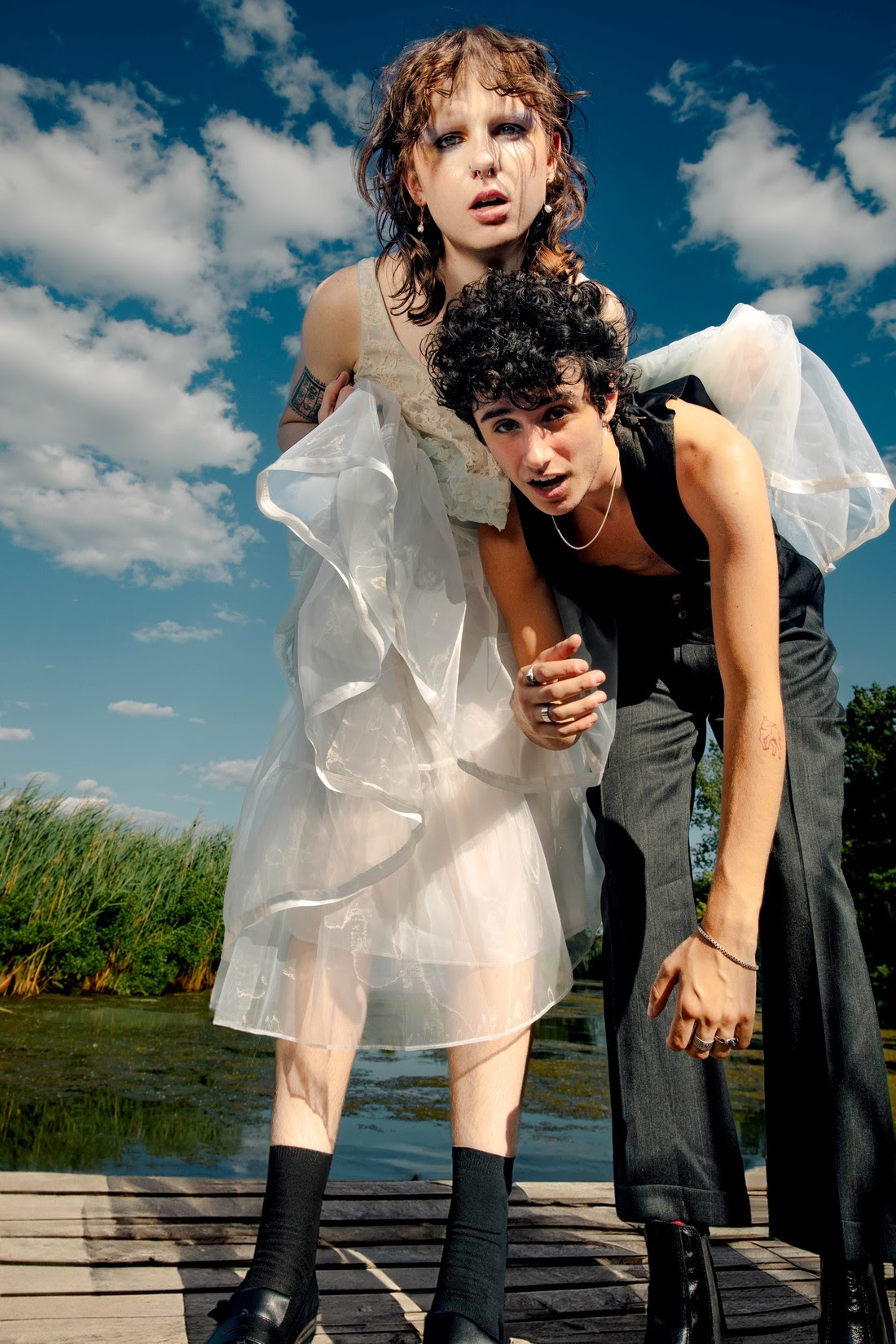Let’s just make something clear: While motorized scooters have infiltrated just about every major city in America to entertain drunks, endanger pedestrians, and undermine mass public transportation, watching kids throw Birds and Limes off a building or lighting them on fire is not funny. Nor is seeing a dog take a shit on these Uber-funded vehicles. It’s fucking hilarious. These scenes of disrupting the tech-bro disruptors have been dutifully captured on the Bird Graveyard Instagram account that Club Night frontman Josh Bertram sees as our most innovative and invigorating chronicle of political art: "It's cool to see the communities here making this very tech-y infusion feel reckless."
Club Night’s 2017 EP Hell Ya could be understood in a similar way: a chaotic and very reckless celebration of the Oakland DIY community getting priced out of Silicon Valley’s neoliberal utopia. Buoyed by the positive response to Hell Ya, Bertram corralled drummer Josiah Majetich, bassist Devin Trainer, synth/sampler Rebecca Lukens, and guitarist Ian Tatum to spend nearly a year working on their debut LP What Life, due out early next year on Tiny Engines. The first two singles, “Mute” and “Trance,” premiere today and contrast the band’s day-glo emo-delia with Bertram’s darkest geopolitical concerns. “They’re the ones that are the most negative about the environment and how we're on the precipice of this collapse right now,” Bertram notes, “and the idea that we might live in a Waterworld/Mad Max scenario is more real by the day.”
But in the meantime, Bertram’s concerns are more local. “It feels like there's a timestamp on living here for creative folks,” he laments during our sprawling, 90-minute phone conversation. The call is a welcome break for the 29-year old, as he’s preparing for Club Night’s upcoming tour by putting in extra hours as a graphic designer for a company that works with minority-run businesses and small organizations. He’s a bit sleep-deprived, living in the lower part of a duplex underneath a tenant with three dogs. But he’s still one of the lucky ones -- he moved in six years ago and has some form of rent control. If he wanted to live in Oakland now, he’d have nowhere close to the financial resources to take part in the city’s hottest housing development: paying upwards of $3000 to live in a college dorm for adult professionals.
I’ve never spent more time in an interview discussing real estate and voting initiatives. But this would be a concern for Bertram, or really any artist living in the Bay Area. I remember Kerry and George from Deafheaven telling me they paid a combined $500 to crash with 12 other people in a converted nunnery in San Francisco when they were making their demo at the turn of the decade. That’s no longer an option in the Bay Area. The hyperbolic escalation of rent and the irresponsible shortage of new housing has been widely documented, while the Ghost Ship tragedy of 2016 has resulted in widespread evictions and ghoulish crackdowns on work-live spaces frequently occupied by low-income, minority tenants. Bertram was planning on showing up to the warehouse on the night of December 2, but was delayed by a late dinner that may have saved his life.
"No one wants to live in squalor, but nowadays we don't have that option with the landlords kicking everybody out," Bertram grouses. The smartass response to anyone in big cities complaining the rent is too damn high: "Why don’t you just move?" That certainly has crossed Bertram’s mind. "Any day now, we’re all gonna have to live in the middle of nowhere. Maybe that would be good for this country if the weirdos and progressives moved out of the big urban areas."
But then again, Bertram was mercilessly bullied in his youth for being a weirdo in general, but specifically for having a gay father in rural America, a “middle-of-nowhere Michigan” town called Holly about 20 miles outside of Flint. There were two salvations as a teen: an all-ages venue called the Flint Local that allowed Bertram to see formative acts like Bear Vs. Shark and Thunderbirds Are Now! in high school and Our Brother The Native, a band he started with an older classmate and another guy from California they met through MySpace at the age of 16.
Bertram describes Our Brother The Native as "experiments" from impressionable teens: "I like these bands, let's make music that sounds like the bands we're listening to." To elaborate, Bertram bought his first banjo in 2004, the same year that Sufjan Stevens' Seven Swans dropped. They released two albums on FatCat Records, the same label responsible for Animal Collective’s Sung Tongs and Feels, as well as Black Dice’s Creature Comforts. Our Brother The Native sounded a lot like early Animal Collective and Black Dice, which had the dual effect of making them a hyped commodity in late-2000s indie rock and also made them a target for critics who also could sniff out the cosplay.
Full disclosure: I reviewed Our Brother The Native’s 2009 record Sacred Psalms and unsparingly panned it in a very 2009 style of writing that I’m not particularly proud of these days. "Did it sting? Yeah," Bertram shrugs, while also admitting he’s not particularly proud of those records either. "But we learned from them, it's a positive." And in a lot of ways, Bertram considers Club Night as a response to Our Brother The Native: "I tell people all the time I was finally making music I could bike to," Bertram admits. "[Sacred Psalms] had no momentum! I went back and thought, 'Man, this is hard to get through, this is a pile of mush.' And now it's fun being in a band that plays propulsive and chaotic music."
Bertram was looking not only to avoid the washed out freak-folk facsimiles of Our Brother The Native, but also the entitled, careerist mindset implanted by his early success. "It was really easy to get completely skewed as a kid like, 'I wanna go back to Europe!' All those bonuses became the focal point to me when it's really about making music or finding a career that would allow it and fund the hobby." But once Club Night got in discussions with the unfailingly tasteful Tiny Engines, the prospect of touring and pressing vinyl required Bertram to reconsider his position. "We had a hard, weird talk as a band because it was [originally] me getting my friends together, almost peer pressuring them to help me make songs, and then it was, 'Do we want to do something more, there's a label here, I never had a vinyl released, this would be something cool to do again.'"
Club Night proudly carry the torch for a kind of spastic, omnivorous indie rock that existed just outside the mainstream in the 2000s and could not be further from the our current understanding of the zeitgeist. Bertram gushes over the dearly departed likes of the Mae Shi, Pretty Girls Make Graves, and Dilute, while Hell Ya generated the widest and weirdest collection of RIYLs I’ve ever seen for a new band -- ranging from Los Campesinos! to Built To Spill to the Go! Team to Destroyer, filled out with some of the most ephemeral Best New Music arcana including Fang Island and Architecture In Helsinki. Personally, it makes me think of listening to Shmap'n Shmazz in a neon car wash.
It’s every bit as overstimulating and disorienting on an emotional level as well, Bertram running from a nightmare past towards a dystopian future, deluged by his love for a city that will either drown in tech money if it doesn’t fall into the sea first. "The record is twofold: I'm so excited I'm here, I'm completely surrounded by people who are doing good and being who they are unapologetically with their heads held high, and then Trump gets elected president and I'm immediately reminded of all these people and communities that are not like that," Bertram explains. "I don't want to go through that again. I'd rather be out here and barely getting by and walking out of my house and feeling accepted, you can't put a price on that."
STEREOGUM: Our Brother The Native existed during a time that's now seen as a golden age for indie rock, where bands like Animal Collective, Grizzly Bear, and Dirty Projectors were the primary focus of music websites and one review could vault a young act into stardom. How does being in an up-and-coming indie rock band in 2018 compare?
JOSH BERTRAM: It's interesting because I've grown up a lot. It was such an insane thing to happen to three teenagers. My ego was through the roof, which was great because everyone in high school treated me like absolute shit. "OK, well no one likes me and I have no friends, but I'm going to play this show in Belgium." Our first show we played in Belgium was a FatCat festival with Vashti Bunyan and Yellow Swans and Max Richter, it's insane when I think about it. It made it alright -- the growing pains of being a teenager in rural America with people who hate anything that's different. There was this light at the end of the tunnel, and MySpace showed me there's this crazy scene in LA with The Smell and AIDS Wolf in Montreal and you could just send them a message.
It was super positive, but having all these people tell you, "You're gonna do something great," or, "You're the next this or that," really fucking messes with you. FatCat kept investing, and they're like father figures, I love all those guys. But they didn't have enough money to put out another [record], and then we spent two years on the last one feeling like I was at a point where we were fine-tuning all that stuff I learned from those critical reviews and getting perspective and going to college.
It was funny, because in between that -- and I'm sure you remember, you're a rock guy -- there was this huge time where everything was just chillwave and bedroom producers, that's all everyone wrote about. No one seemingly cares about rock music and that's when I was starting to get into wanting to do that. So then I just kinda killed the ego and stopped thinking about it in a sense of making records and touring and being a musician. I just did it because I like it. And it was cool to bring that back into my life. I mean, you write because you like to write and it's nice to get paid for it, but it's hard to do any creative career now. If you're not enjoying the making and the process itself, it brings you down a negative hole.
It's hard to say what the biggest difference [between 2009 and 2018] is, but the main one is everyone's just hoisting each other up and championing each other, at least in this indie/emo rock scene. It's been really cool to look at it and slightly be a part of it, it's a community that I missed having in my life. Because it's still small and you can get really in the day-to-day feeling like what you're doing is useless and our country is crumbling, "Why are we even doing this?" But it's really nice when you can interact with people all over and say, "Thank you, your song got me through the day."
STEREOGUM: It seems like a lot of bands are currently struggling with the same problems -- "How can I justify making indie rock music right now when our country is going in the shitter?" and "Do I address politics in my music or should it be an escape?" I imagine it'd be hard to write about anything else.
BERTRAM: I've never really addressed politics, and it's weird, because there's no answers in music, but it helps you get through the shit. Hearing someone else in pain or shouting, that's why I like rock music that's intense, it creates this wall that blocks out everything else and gets the adrenaline pumping and gives you a little heft in your day. We all should be talking, maybe that's our job in our different platforms of music. We might be preaching to the same people, but there are definitely conservative bros that are commenting on bands' Twitters, "How could you say this and make this political statement?" How do you like this band and not realize these are progressive, liberal people who want equality for all and trying to preach love? Maybe it'll get through to somebody who has been pretty ignorant.
STEREOGUM: When bands get big enough, they're inevitably going to have a portion of the audience that willfully ignores the politics. How many famous acts have told Republicans to stop using their music? I mean, Paul Ryan listened to Rage Against The Machine. I also know conservative people who are into the National and Obama used "Fake Empire" as a campaign song.
BERTRAM: I think we all know the majority of people who listen to mainstream music aren't wanting to dissect or have something deep thrown at them, they want something in the background. But even Taylor Swift saying something -- yeah, maybe it was a little late and it was after the tour and tickets were sold, but at least she's doing something.
I was listening to a podcast with Tim Kinsella the other day and he said, "I have this constant battle where I spend so much time on my art and music and writing -- am I doing the right thing with my time here while shit is really going down the drain? But this is my unique talent and voice I have and maybe it's not planting trees or making all the protests that I could, but I think we all need to use whatever tool set we have even if it's just angry music." Those protestors are gonna put their earbuds in and want to hear something like, "Fuck yeah, let's do this." I have the same thing -- are we doing enough? I spend so much time on music, is that helpful now? Should we all stop making art and take up fucking arms because the civil war is coming? But if you're questioning what you're doing and how you're spending your time, that's what we should all be doing.
STEREOGUM: I don't think I’ve seen a band with a larger and wider range of RIYLs than Club Night. Are there any that make you think, "That is totally not us."
BERTRAM: Whatever anyone finds they get out of it, that's exciting to me. It was weird when you mentioned Los Campesinos!, I haven't listened to them in a long time and then I went back to their early records and thought, "We totally fit with them." Like damn, I want to play with them, I forgot how amazing they are.
Fred Thomas and I were talking and he said it reminds him of Cap'n Jazz. I love Cap'n Jazz, Tim [Kinsella] is one of my mentors and I'm honored to maybe unconsciously have some of his [style]. I mean, he would probably hate that [laughs]. There's more Joan Of Arc in there actually. I'm just never offended, because we're not going for anything collectively, none of us could ever agree, "We're going for this." We can't. I don't think there is one band we all listen to. It's kinda frustrating in a way. I can't say, "Do that bass part again because it reminds me of something from a Death Cab record" or something that hits me emotionally, because Devin probably doesn't like that band.
STEREOGUM: Maybe it’s my age showing, but I get the Mae Shi, Blood Brothers, and Pretty Girls Make Graves, bands that always sounded like they were on the verge of imploding before they did just that.
BERTRAM: We're all pulling from music that we want to hear more of. There are so many bands where I wish they made more records, so it's nice to carry a baton for the music you really love that doesn't exist. It's weird, people got into shoegaze and yacht rock and I dunno what you call it, mood-elevator rock. But I'm open. I want to listen to everything and anything, but what I choose to listen to is the music that shaped me. I'm not one of those people who move on to a genre and disregard everything like, "Oh, I didn't listen to the Blood Brothers." No, I love the Blood Brothers.
I would never feel shame for what brought me up. I mean, even Korn -- nu-metal was pretty bad, but it infused a lot of weird, insane shit with the guitars and scatting. You just can't be a snob and cut things out. Ian makes country mixtapes and they're so good! And I never liked country -- [the mixtape] is still old and sad and whiskey drinking, but I never really delved into this genre before. I think it's good to keep an open mind and that's what was great about the early 2000s in rock, I mean The Ugly Organ was super weird and everything on Saddle Creek was blazing these crazy trails, like the Faint.
STEREOGUM: I’ll tell you what, The Faint's held up extremely well -- go see them live and they still bring a crowd that’s extremely hyped to see the Faint.
BERTRAM: I would love to see them as an adult. Danse Macabre, that's my kind of fun. I think I put it on at a Thanksgiving potluck and people shot it down. I like music that's sad and intense...maybe not always sad, but just there's an intensity there. Why would you choose to listen to anything that's neutral? Because life isn't neutral, it's intense. Rarely are we just stagnant. I'd rather be moved.
STEREOGUM: When I look back on the era of the bands we were talking about before, there was still plenty to be outraged about in 2003 -- America is stuck in a forever war, George W. Bush is president -- and yet politics didn't seem to infiltrate music and the conversation around it to the extent it does now.
BERTRAM: I hate it when other people in my life and my family say, "It'll get better, shit happens, we'll get through it." I don't know! Maybe because this is my first crisis as a… "woke human being." When 9/11 happened and the war, I was in middle school and was just working on getting to high school and being bullied and harassed. Now being an adult, it still feels unprecedented, having this tyrannical, insane sociopath running our country and involving all these people who feel neglected and upset and just reaching out to blame anyone for their problems.
It's really strange to be a person that got out of this place that he hated in the middle of the country where everyone made fun of me, calling me the f-word when they found out my dad was gay and just being mercilessly tormented. Kids are mean all the time for any reason, but if you give them a reason, they don't let you live it down. It's weird to put that down, shelve it and never think about it, move to where you feel happy and safe and loved.
Ian's in a band Meat Market and Unity with this guy Jeffrey Cheung who started this queer skateboarding company and it's more like community outreach. They have workshops where they help people make zines and their art and they have free skateboard giveaways, and they're trying to give everyone a safe space and a platform to be who they are. It's so exciting, it's the most uplifting thing. All these people feeling scared to do or love what they want or even walk around in their skin or their gender, it reminded me how bad it was to grow up in a place where you don't get to experiment and be you. I never understood that energy to put others down -- are you just bored? How do you have all this energy and time to hate? That's the question that keeps me up at night. Pick up a pencil or a guitar.

What Life is out early next year on Tiny Engines. "Mute" and "Trance" are available now as a digital 45. Check out Club Night on tour this fall:
10/28 Ann Arbor, MI @ Metal Frat
10/29 Chicago, IL @ Subterranean Downstairs
10/30 Detroit, MI @ Marble Bar
10/31 Pittsburgh, PA @ Café Verona
11/01 Philadelphia, PA @ Lizard Lounge 215 w/ Peaer
11/02 Bloomfield, CT @ Flesh Mall w/ Peaer
11/03 Boston, MA @ The Farm w/ Peaer
11/04 Brooklyn, NY @ Baby’s All Right w/ Peaer & Oceanator
11/05 Red Bank, NJ @ Pearl Street w/ Fire Is Motion
11/06 Washington, DC @ Mystery Inc.
11/07 Cleveland, OH @ Dad Farm
11/08 Grand Rapids, MI @ Snake Shack
11/09 San Francisco, CA @ Café Du Nord






